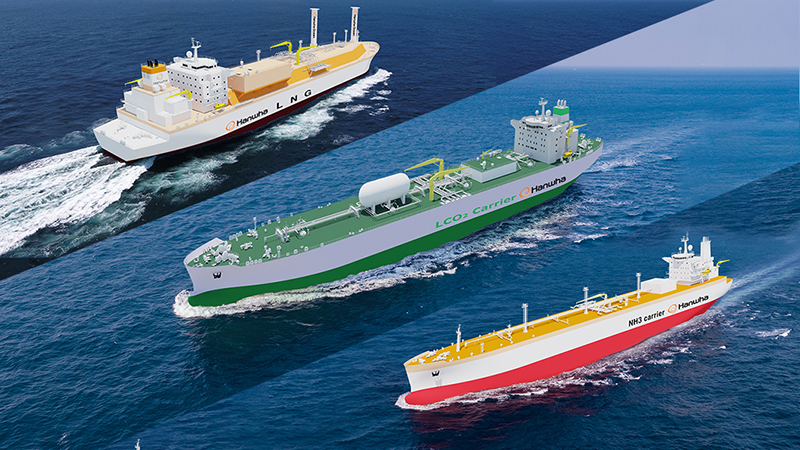Hanwha Ocean recently announced that it has signed a four-party Joint Industrial Project (JIP) with American Bureau of Shipping (ABS), Ecolog of Greece, and Babcock LGE of Scotland to develop a 40,000 cbm large liquefied carbon dioxide (LCO2) carrier.

According to the agreement, the partners will share their expertise and experience in CO2 carriers to design safe and efficient large liquefied CO2 carriers. The four companies will study key issues related to the operation of the ships and how to minimize greenhouse gas emissions during operation, as well as various purity levels of the cargoes to be transported, focusing on the development of CO2 carriers applying the latest technology.
Hanwha Ocean will be responsible for a comprehensive review of the vessel’s propulsion performance and the ship’s detailed design components such as the core cargo hold of the CO2 Carrier. Ecolog, a subsidiary of the Greek shipping company Gaslog, is responsible for providing global industry requirements and ship operations expertise for the CO2 liquefaction carriers. The company specializes in the Carbon Capture, Utilization and Storage (CCUS) sector, including ship operations. ABS will be responsible for reviewing variables such as CO2 purity, as well as supervising and reviewing the overall design specifications. Bomcock LGE will be responsible for the design development related to the cargo operations system, including the re-liquefaction unit.
Last month, Hanwha Ocean announced a capital increase of 2 trillion KRW ($1.5 billion), of which 600 billion KRW will be invested in the development of environmental friendly propulsion systems and related transportation vessels. With this, the company plans to lead the market for environmental friendly ships and ensure sustainable competitiveness in the shipbuilding industry, thus changing the paradigm of the maritime industry in the future.
In recent years, the global shipbuilding and shipping industries have gradually realized the importance of developing CCUS as one of the ways to achieve carbon neutrality. In the past, small LCO2 carriers of less than 3,000 m3 class were mainly built for food transportation, but with the gradual increase in demand, the market for large LCO2 carriers is expected to expand in order to ensure economic efficiency.
Currently, the world’s largest LCO2 carrier is ordered by Greek owner Capital Maritime Group. The vessel, with a cargo tank capacity of 22,000 cbm, was built by Hyundai Mipo Shipbuilding at a cost of $70.69 million per vessel and is scheduled for delivery in the second half of 2025. With an overall length of 159.9 meters, a breadth of 27.4 meters and a height of 17.8 meters, the vessel is designed for transporting carbon dioxide, and can also transport a variety of liquefied gas cargoes such as liquefied petroleum gas (LPG) and ammonia (NH3), and adopts the Ammonia Duel Fuel Ready technology, which can be converted into an ammonia-powered vessel in the future.
According to the Global CCS Institute, the carbon capture and storage market is projected to grow at more than 30% per year, reaching 7.6 billion tons of carbon capture globally by 2050. This means the demand for LCO2 carriers, which are the primary maritime vehicle for Carbon Capture, Utilization and Storage (CCUS) technology, will also increase.


